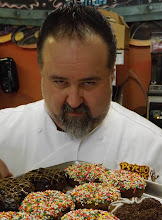 Las Cruces Sun-News Article
Las Cruces Sun-News ArticleLAS CRUCES — When Paul Bosland exhaled after taking a bite of the world's hottest chile pepper, it felt like he was breathing fire.
"Got milk?" was the first thought to cross his mind, he said.
The next thing Bosland thought, after gulping down a soda, was, "That chile has got to be some kind of record." He was right.
In the fall of 2006, the Guinness Book of Records confirmed that New Mexico State University Regent's Professor Paul Bosland had indeed discovered the world's hottest chile pepper, Bhut Jolokia — at 1,001,304 Scoville Heat Units, the pepper is nearly twice as hot as Red Savina, the chile pepper variety it replaces as the worlds hottest.
 "The name Bhut Jolokia translates as 'ghost chile,'" Bosland said, "We're not sure why they call it that, but I think it's because the chile is so hot, you give up the ghost when you eat it!"
"The name Bhut Jolokia translates as 'ghost chile,'" Bosland said, "We're not sure why they call it that, but I think it's because the chile is so hot, you give up the ghost when you eat it!"
According to Bosland, Bhut Jolokia is native to northeastern India. A member of NMSU's Chile Pepper Institute visiting India sent Bhut Jolokia seeds back to NMSU for testing in 2001.
Bosland reported that the variety has compelling potential in the packaged food industry as a food additive. The pepper could be pickled while still green, dehydrated and used as a seasoning. Because the heat is so concentrated, less would be needed and food manufacturers would save money.
"This isn't something you'd pickle whole and eat," Bosland said, "but it could replace dehydrated jalapeno as an additive."
Bhut Jolokia is not NMSU's first brush with chile greatness; the record-holder for world's largest chile pepper is a specimen of the 'NuMex Big Jim' variety. The record-holder was grown near Hatch, but the variety was developed at NMSU.
What are Scoville Units?
· A pharmacist named Wilbur Scoville invented the Scoville Scale in 1912 to measure the heat of peppers. A "Scoville Unit" is actually a measure of capsaicin (the chemical in hot peppers that is responsible for their heat).
· Scoville’s test was a comparative taste test that is considered subjective by today's standards. A more sophisticated method is in use today, but in honor of Wilbur Scoville, the unit of measure is still called the Scoville.
It seems to me if Professor Bosland wants the last bite here he can have it!














No comments:
Post a Comment